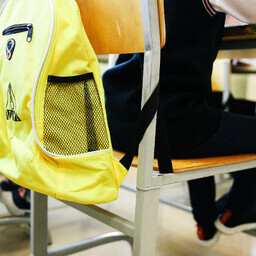Jürgen Rakaselg, haridusministeeriumi juht, ütles, et koolidel pole praegu kohustust teatada, kas nad korraldavad esimese klassi koolikatseid. Praegu on selliseid koole vähe.
Koolikatsed võivad suurendada ebavõrdsust
. Rakaselg ütles, et see on paratamatu. Teistes riikides on sama juhtunud. Ministeerium ei taha seda näha. Hariduslik ebavõrdsus kasvab Eestis.
Koolikatsed võivad suurendada ebavõrdsust
Tõlge fraasile: Koolikatsed võivad suurendada ebavõrdsust
EN
Entrance exams can increase inequality
Üheks lahenduseks võib olla loos
. Rakaselg ütles, et nad räägivad omavalitsustega.
Suuri muudatusi ei tule, aga väiksed sammud küll
.
Üheks lahenduseks võib olla loos
Tõlge fraasile: Üheks lahenduseks võib olla loos
EN
One solution could be a lottery
Suuri muudatusi ei tule, aga väiksed sammud küll
Tõlge fraasile: Suuri muudatusi ei tule, aga väiksed sammud küll
EN
No major changes are coming, but small steps will be taken
Koolikatsed ei pruugi olla lastele head
. Rakaselg ütles, et paljud täiskasvanud teevad sellest oma projekti. Vanemad on valmis palju raha kulutama, et saada oma lapsed parematesse koolidesse.
Koolikatsed ei pruugi olla lastele head
Tõlge fraasile: Koolikatsed ei pruugi olla lastele head
EN
Entrance exams may not be good for children
Koolikatsete korral võivad majanduslikult tugevamad pered saada eelise.
Lapsed sõltuvad sageli vanemate võimekusest
neid ette valmistada, mitte oma võimetest.
Lapsed sõltuvad sageli vanemate võimekusest
Tõlge fraasile: Lapsed sõltuvad sageli vanemate võimekusest
EN
Children often depend on their parents' ability
Ministeerium jälgib olukorda
, kuid ei keela koolikatseid veel. Rakaselg ütles, et nad tahavad mõista põhjuseid, miks koolikatsed toimuvad.
Ministeerium jälgib olukorda
Tõlge fraasile: Ministeerium jälgib olukorda
EN
The ministry is monitoring the situation
Mõned koolid püüavad luua oma mainet
, kasutades legaalseid meetodeid. Nad võivad eemaldada õpilasi, kes võivad langetada kooli tulemusi. See on ebaeetiline.
Mõned koolid püüavad luua oma mainet
Tõlge fraasile: Mõned koolid püüavad luua oma mainet
EN
Some schools try to build their reputation
Rakaselg ütles, et koolikatsete tulemusel on vähem lapsi, kes räägivad teist keelt emakeelena. Nende lapsed on sageli sotsiaalmajanduslikult tugevamad. Kuid ka neil võib olla abi vaja.
Vanemad valivad kooli oma vajaduste järgi. Meedia rõhutab sageli riigieksamite tulemusi. Kuid need ei näita kooli tõelist kvaliteeti. Ministeerium peab midagi ette võtma.
Üks võimalus on koolikatsete keelamine
.
Üks võimalus on koolikatsete keelamine
Tõlge fraasile: Üks võimalus on koolikatsete keelamine
EN
One option is to ban entrance exams
Jürgen Rakaselg, the head of the Ministry of Education, said that schools are currently not obligated to report whether they are conducting first-grade school tests. Currently, there are few such schools.
School tests may increase inequality. Rakaselg said that this is inevitable. The same has happened in other countries. The ministry does not want to see this. Educational inequality is growing in Estonia.
One solution could be a lottery. Rakaselg said that they are talking to local governments. There will be no big changes, but small steps will be taken.
School tests may not be good for children. Rakaselg said that many adults make it their project. Parents are willing to spend a lot of money to get their children into better schools.
With school tests, economically stronger families may gain an advantage. Children often depend on their parents' ability to prepare them, rather than on their own abilities.
The ministry is monitoring the situation but has not yet banned school tests. Rakaselg said that they want to understand the reasons why school tests are taking place.
Some schools try to build their reputation using legal methods. They may remove students who may lower the school's results. This is unethical.
Rakaselg said that as a result of school tests, there are fewer children who speak a second language as their mother tongue. Their children are often socioeconomically stronger. But they may also need help.
Parents choose schools according to their needs. The media often highlights the results of state exams. However, these do not show the true quality of the school. The ministry must take action. One option is to ban school tests.

